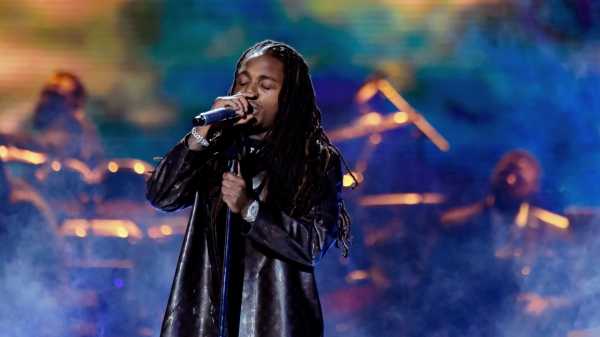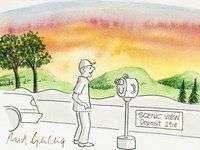
Bathed in icy turquoise, purple, and red hues, the R. & B. singer Jacquees took the stage at Irving Plaza on Sunday night with the confidence of a seasoned veteran and a reception fit for a champion. The singer, just months ago, had set social media alight with debate when he proclaimed himself the “King of R. & B.” for his generation, but there was no disagreement among the sold-out crowd. In fact, the declaration—which is essentially part of his brand now, right down to the merch with the phrase emblazoned on it that was on sale in the lobby—was met with affirmative cheers every time that Jacquees or his d.j. shouted it.
Jacquees knows his audience, and he has capitalized on a moment when it seems increasingly rare that an R. & B. song isn’t basically hip-hop, or over-sanitized as pop, or some vaporous combination thereof. He has leaned into the qualities that people love about the serenades of the nineties and early two-thousands—a time of baby-faced artists singing convincingly about their carnal impulses and wrecked hearts—and repackaged them for a new era, right down to the male dancers choreographed for sexual suggestion. His acts seems to be working: women in the audience on Sunday shredded their vocal cords every time he held eye contact, or flashed his smile, or hit a falsetto.
With such an evident affinity for R. & B.’s bygone time, it’s no coincidence that Jacquees’s breakout single, “B.E.D.,” from 2016, annexes Avant’s 2003 hit “Read Your Mind,” a tactic that is very much in vogue right now. There are those who see his interpolations and his covers of other people’s songs (deemed “Quemixes”) as uncreative and cheap gimmickry, but, when executed in more subtle fashion—the nod to Keith Sweat’s “Get Up On It” on the standout track “You Belong to Somebody Else,” or to Usher’s “Nice and Slow” on the single “Inside”—they seem like reverence and proof of an artistic DNA. (Jacquees’s début album, “4275,” featured stars from several periods, including Trey Songz, Jagged Edge, Donell Jones, and LaTocha Scott, from the nineties girl group Xscape.)
Snarky jokes about Jacquees’s nobility may have been abundant online, but the fans piled into Irving Plaza were very much real. And the show wasn’t just the fruits of his tenacity, the years of Quemixes, and an astute ability to assume a throwback posture; it was also evidence of a renewed and growing interest in R. & B. as a genre that exists on its own terms. Last year was a watershed moment for the newest generation of R. & B., and included the débuts of such promising acts as VanJess, Summer Walker, Pink Sweat$, and Marco McKinnis. And, keeping with the momentum, the Jacquees concert capped a particularly strong week for new R. & B. recordings—last week, the Atlanta-based crooner Elhae and the California artists Eric Bellinger and Kehlani all released new projects.
Elhae’s “Trouble in Paradise” is undeniably contemporary, though still firmly rooted in R. & B. conventions. It’s a concept album about a relationship’s unravelling and the potential for reconciliation. One standout, “I.D.B.I.L.,” captures the loss of faith in love; Elhae’s phrasing imbues the song with a sense of measured reflection and melancholy. Another track, “Sanctuary,” summons the spirit of the nineties quartet Jodeci—church boys who traded in their choir robes for bare chests and leather jackets, and then transformed, through song, the bedroom into a holy place. Here, we find Elhae, who was raised in his mother’s choir, likening the curves of a woman’s body to a temple in which he is baptized. In this moment, he’s playing with the very element that keeps some older R. & B. fans from embracing the new school: the gospel.
MORE FROM
Culture Desk

A Restaging of “Lolita, My Love,” the Musical “Too Dark to Live”

What to Do in N.Y.C. This Weekend: Phoebe Waller-Bridge, Rennie Harris, and Rhode Island-Style Pizza

Mort Gerberg on Fifty Years of Cartooning

An Oscars-Night Diary

Live-Drawing the 2019 Oscars

A Fraught Oscars Season Limps to the Finish Line
Great R. & B. singers have long taken cues from the genre’s anointed counterpart. (See: Aretha Franklin, Fantasia, Kelly Price, Usher, John Legend, Anthony Hamilton.) “Soul” as a quality is derived from the visceral shift in sound that often takes place in the pulpit—the idea that what’s being channelled through the voice is no longer physical but supernatural. The spiritual side of “Trouble in Paradise” peeks through in certain tones and culminates on the closing track, “Moments,” a slow-burning duet with Sevyn Streeter (another artist whose voice was cultivated at the altar). What naysayers of current R. & B. often miss is this transcendence, though it still abounds among a new vanguard, hidden behind more profane layers than ever.
Eric Bellinger, who staked a claim to R. & B.’s throne back in December, with his song “King” (in response to Jacquees), makes records that both reflect his church background and are infused with the infernal. The singer and producer’s latest release, a thirty-two-track manifesto titled “The Rebirth 2,” features an abundance of bedroom music decorated with gospel tricks. “The Sexy Song” is set against a bed of choral harmonies, while “Make Up for It” soars through layers of voices stacked against one another; “Back It Up,” with an assist from BJ the Chicago Kid (who is also no stranger to the sacred music), breathes divinity into sex through impassioned vocal acrobatics. Bellinger understands the power of multiple voices at once, how a choir can turn the banal into something sublime. (Kanye West’s Sunday Service series rely on this very tactic.)
But as millennials have fled the church a sophisticated honesty has arrived, channelled through R. & B., that’s able to convey the soulless disconnect of our hyperconnected lives, whether in wispy minimalism void of warmth or through raw candor. The old-school R. & B. canon was largely written in black-and-white—burning desire and tearful heartache—but the world outside of the sheets exists in shades of gray. Songs as full of yearning as, say, Jodeci’s “Cry for You” or Blackstreet’s “Don’t Leave Me” are rare, because the romantic stakes aren’t that high when you can open an app to lick your wounds. Instead, we’re treated to music that depicts a perpetual state of indecision and emotional disrepair: SZA’s breakout album “Ctrl,” from 2017, was so captivating in part because there were no neat conclusions. The singer Kehlani has achieved a similar effect in her music, which has incorporated topics that range from mental health to familial disarray; her new release, “While We Wait,” is no exception.

Kehlani’s honeyed voice cloaks uneasy feelings in a hypnotic state of tranquillity.
Photograph by Arturo Torres
Kehlani distills the complex emotions of deeply complicated relationships in the length of a song. The poignant opener, “Footsteps,” which features the early- and mid-two-thousands crooner Musiq Soulchild, embodies the uncertainty of walking away from a lover while simultaneously hoping that it isn’t really the end. The pair perform the push-pull to wrenching effect. Elsewhere, on “RPG,” she and 6lack take aim at the roundly frustrating game of trying to ascertain a partner’s motives—even when that partner has given what’s been asked of him. But Kehlani’s honeyed voice cloaks uneasy feelings in a hypnotic state of tranquillity known, simply, as a vibe. The singer Summer Walker follows in a similar beatific confessional vein, except she finds power where many have only found discomfort. Her début album, “Last Day of Summer,” and a follow-up live EP, “Clear,” from January, approach R. & B. with refreshing progressivism that explicitly embraces autonomy, whether in good decisions or in bad ones.
These powerful records arrive amid a continual lament that R. & B. is dead, a sentiment that rings hollow in the face of dynamic evolution and mutual support within the genre. Both Kehlani and Elhae tweeted praise of their peers’ releases, as did last year’s breakout star, Ella Mai, who just took home a Grammy for her song “Boo’d Up.” Each of these artists encompasses a different style—their releases (and performances) configured as testaments to past and present—but, taken together, they offer a snapshot of a scene that is vibrant and coming into its own once more.
Sourse: newyorker.com






